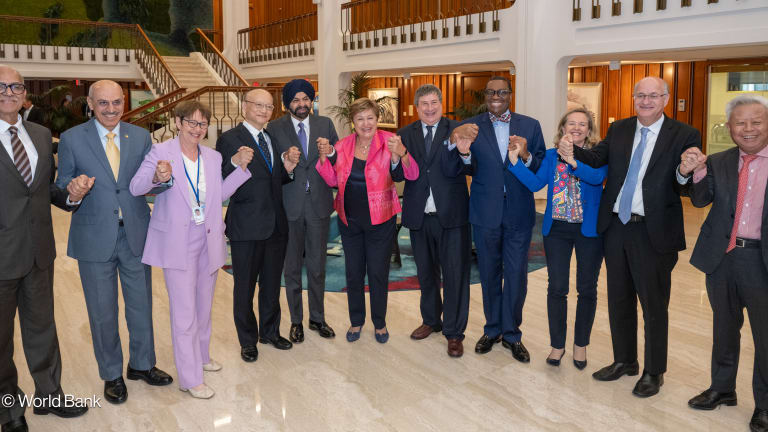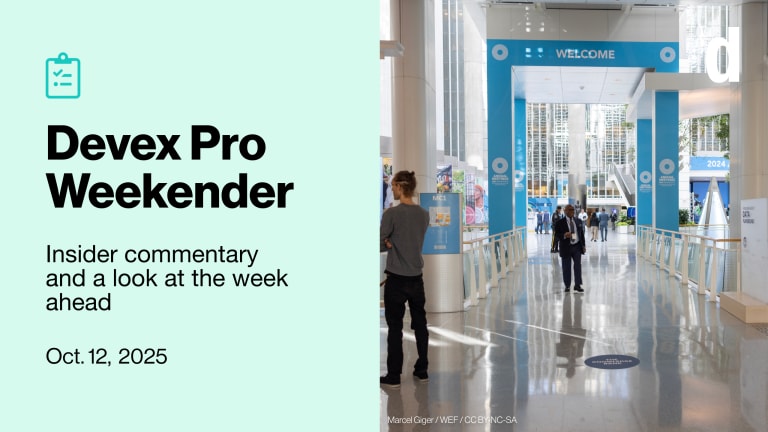
We learned last week that one of the world’s leading transparency champions — Kristalina Georgieva — will join the World Bank as CEO of the International Bank for Reconstruction and Development and the International Development Association. I found this hugely exciting: it represents another opportunity for the bank to regain its leadership on transparency.
The World Bank was a champion of the open data agenda in the early days. This really mattered, because the bank is arguably the world’s most influential development institution — both in terms of the volume of resources they mobilize as well as in terms of standard setting for the whole aid and development sector. But then it went off the boil and momentum slowed.
After last month’s International Open Data Conference in Madrid, however, there are exciting signs that maybe the bank are back.
When the World Bank announced its Open Data Initiative in April 2010, it was a big deal. Until then, the bank had charged for access to the data it collects on poverty and development. Anyone wanting to access the World Development Indicators, from government ministries to graduate students, had to order a CD-ROM, pay for online access or track down a hard copy in a university library. In his announcement in 2010, former World Bank President Robert Zoellick pointed out that the bank was a government-owned institution, and since we are all taxpayers somewhere, it wasn’t appropriate to ask us all to pay for data twice.
The bank was instrumental in launching initiatives including the Open Government Partnership, Open Contracting, and numerous open data projects in its member countries. It has helped fund three international open data conferences such as the one in Madrid. The critical piece for me was that the World Bank was also a vital early champion of the International Aid Transparency Initiative. In particular, the bank helped ensure that the standard was designed to link with budgets. That simple step stops IATI from just being about donor flows and allows it to join up with developing countries’ own budgets and public spending.
The bank’s concessional lending arm, the International Development Association, has been a consistent good performer in the Aid Transparency Index compiled by Publish What You Fund. They came first in the index in 2011, and while they have since been overtaken by a few others, they are still in the top category.
Then the agenda seemed to take a backseat. Champions moved on. Restructuring within the World Bank shifted reformers to other parts of the system. Progress on aid transparency and transparency of the bank’s operations and research products slowed. The bank has been absent from new discussions about joining-up data standards — the conversation it was so vital in starting. Meanwhile, the part of the bank that lends to the private sector, the International Finance Corp., has made much slower progress on transparency.
But I am really hopeful that this will change now, both with Georgieva’s appointment and a recent announcement by the bank’s Open Data Initiative head Haishan Fu that the bank is putting more results data online. To regain its leadership role as a standard setter for all data, open and closed, the bank needs to:
1. Identify high level and technical champions with a mandate to promote the integration of aid and extractives data with country budgets, and deepen engagement with initiatives such as IATI, www.identify-org.net and open contracting.
2. Test and prototype how emerging data standards, such as IATI and open contracting, can be joined up with other standards that the bank promotes and uses in order to create a full picture of financial flows and results, including loans to the private sector and “blended finance.”
3. Above all, incorporate the open principles and standards outlined in this piece into the bank’s internal systems as they are upgraded. Critically, make sure that financial and knowledge management systems the bank supports are open by default. For example, no one should ever have to pay or register to read a paper published by a World Bank researcher.
If the World Bank implements these recommendations, then I am hopeful that their leadership on this agenda can and will be re-established. This is great for the bank itself, as that is where it should be, but importantly for the rest of us, it will also have a serious impact on aid transparency globally and encourage others to follow their lead once more.
Join the Devex community and access more in-depth analysis, breaking news and business advice — and a host of other services — on international development, humanitarian aid and global health.








